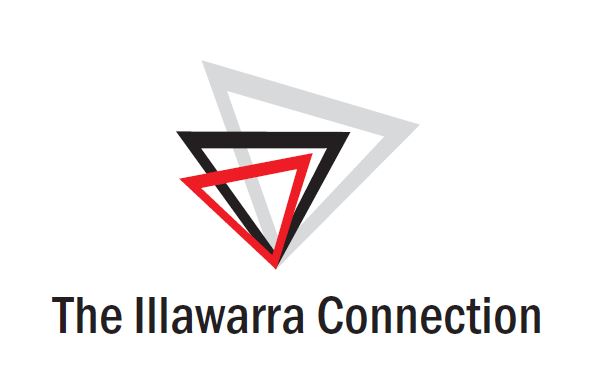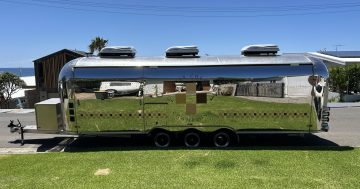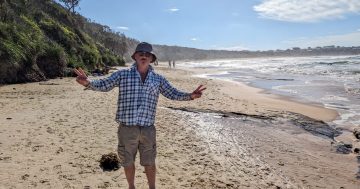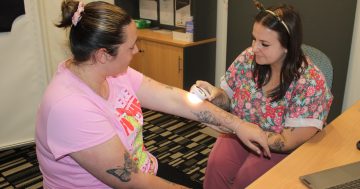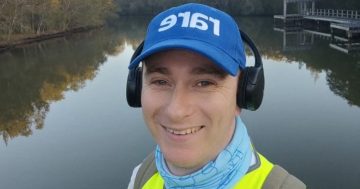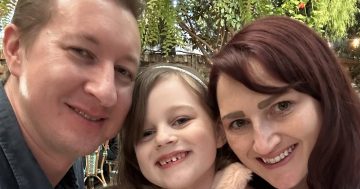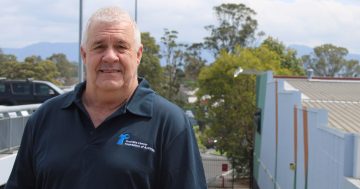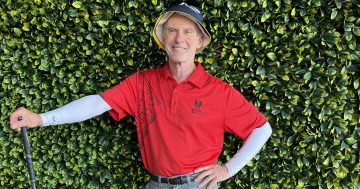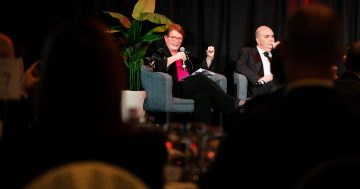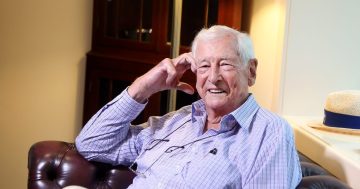
Skin Check Champions founder Scott Maggs is psyched for the next pop-up clinic at Coledale RSL, offering full body skin checks by experts from Corrimal’s Advantage Skin Clinic. Photo: Region.
A shiny new airstream can be spotted about the Illawarra, and inside is salvation for thousands of Australians at risk of our “national cancer”.
The mobile skin cancer clinic is an initiative of non-profit charity Skin Check Champions, who are on a mission to halve the number of Aussies being killed by one of our most treatable health issues by 2030.
The airstream has been fondly named the “Silver Bullet” – a play on words around targeting the country’s biggest care gap in tackling skin cancer, which takes the lives of more than 2500 Aussies every year – about one every 3.5 hours.
“Australia has done exceptionally well at prevention. ‘Slip Slop Slap’, ‘No hat, no play’ – we all grew up with these brilliant campaigns. Our treatment and research is world-class. Immunotherapy, the quality of our dermatologists and surgeons and the treatment options people have now are the global gold standard. Yet Australia still has one of the worst skin cancer rates in the world,” Skin Check Champions founder Scott Maggs says.
“The big thing that’s been missing is early detection, which is crazy, because compared to other cancers, skin cancer has one of the highest success rates if detected and treated early – over 98 per cent of people will survive. So finding suss-looking spots should be a much bigger part of our national healthcare strategy.”
Scott created Skin Check Champions in 2010 after his best mate Wes Bonny was taken by skin cancer at the tender age of 26.
“It came as such a shock,” Scott says. “Like most 20- and 30-somethings, skin cancer was just not on our radar.”
The organisation started as an initiative called “Beard Season”, which saw Wes’ closest friends – Scott included – growing beards and using them as conversation starters to issue a simple challenge – get your skin checked.
After his first Beard Season, Scott’s prominent burgundy chin mane saved at least half a dozen people from skin cancer. He realised a field of facial follicles could actually make a difference.
“The more the beard grew, the more the idea grew and it got to a point where I thought ‘I can’t just shave this thing off tomorrow, I have to give it some purpose,'” he says.
He grew it for over a decade before shaving it off in May 2021, when his fundraising efforts reached $1 million which Scott, AKA “the Million Dollar Beard”, used to fund a research project to investigate the Skin Check Champions pop-up clinic model.
The Silver Bullet is the latest in Skin Check Champions’ multipronged approach to improve Australia’s early detection deficit. This also includes pop-up skin check clinics, a search tool connecting users to Skin Check Champions’ network of recommended specialists and the training of nurses in rural and remote areas as “nurse dermoscopists” to grant access to these vulnerable communities.
“We started off working with dermatologists but quickly found there are less than 600 in the country, fewer who were focused on skin cancer. They’re almost all located in metropolitan areas, they’re really expensive and their weekends are sacred, so their availability for weekend events is tricky,” Scott says.
“It’s a similar problem with skin specialist GPs who often have very long wait times and may also be under the pump with other healthcare issues to juggle. To scale to critical mass, we found working with nurses in this specialisation allows us to tap into the largest workforce in Australia.”
Skin Check Champions has now completed over 18,000 free educational screenings all around Australia and facilitated well over 200,000 checks through its specialist networks.
Through its own skin checks, the organisation has detected around 450 potential melanomas and close to a thousand other skin cancers. The combined number detected from all its efforts is likely much higher.
Scott hopes a question of pure mathematics will help secure much-needed government funding to reach its lofty goals.
“The healthcare cost of an undiagnosed late-stage skin cancer can average well over $30,000 – not to mention the emotional and economic impact. Times that by 450 and we’ve saved Australia over $13.5 million. We did all that with just $1 million in funding, so that’s a 13.5:1 return on investment,” he says.
“So far, our clinics have been somewhat opportunistic – we go places if we have sponsorship from a brand or can raise the funds through a community event. The ultimate goal is to be as targeted as we can.
“This is the first year we’ve put together a budget proposal for government funding, because we have the data and experience to back us up now.”





The prevalence of melanoma skin cancer is 120 times higher in surfers than in the general population, 60 times higher in swimmers and 80 times higher in regular walkers/runners, which perhaps explains the high skin cancer rates in coastal regions like the Illawarra.
It’s why, with adequate funding, Skin Check Champions will also make more appearances closer to home.
“We would love to do more pop-up clinics at beaches and festivals and events on a weekend in the Illawarra if we can get funding for them,” Scott says.
“Another encouraging sign is that more and more local businesses started employing us to come and check people at work, which removes all those barriers of time, cost and access and is a great way for organisations to look after their people – especially if they work outside.”
For more information visit Skin Check Champions or follow them on Instagram @SkinCheckChampions.







